Brazil is home to some of the world’s most breathtaking waterfalls, each a testament to the country’s incredible natural beauty. From the awe-inspiring Iguazu Falls, a UNESCO World Heritage Site, to the lesser-known but equally captivating Chapada dos Veadeiros, these Brazil waterfalls are must-see destinations for nature lovers and adventurers alike. These cascades in lush rainforests, rocky plateaus, and deep canyons showcase Brazil’s diverse landscapes and vibrant ecosystems. Visiting these waterfalls offers a chance to witness dramatic drops, thunderous flows, and rainbow-filled mist, providing unforgettable experiences in the heart of nature.
Top 10 Brazil Waterfalls
Brazil’s top 10 waterfalls, including the iconic Iguazu Falls and hidden gems like Cachoeira do Tabuleiro, offer stunning views and thrilling adventures. These natural wonders showcase Brazil’s diverse and captivating landscapes, from roaring cascades to serene pools.
1. Iguazu
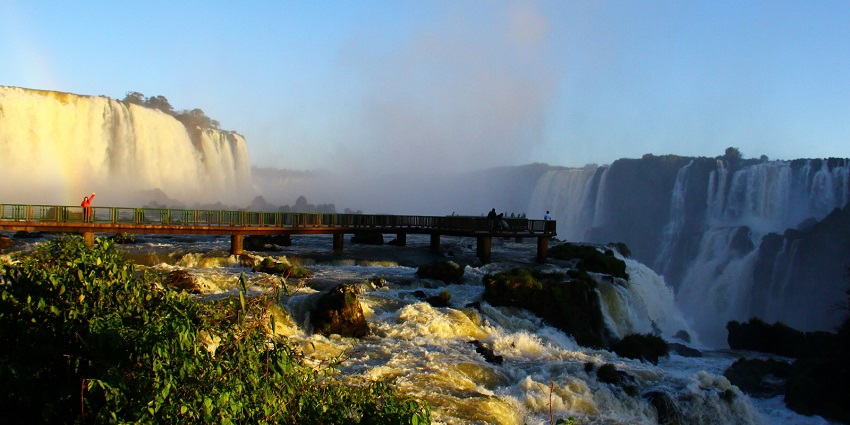
Photo: Cesar I. Martins / Wikimedia Commons
Located on the border between Brazil and Argentina, Iguazu Falls is one of the largest waterfall systems in the world, featuring 275 individual falls that cascade over a 2.7-kilometer stretch. The falls, which can reach heights of up to 82 meters, are surrounded by lush rainforest and diverse wildlife within the Iguazu National Park, a UNESCO World Heritage site. The most famous section, the Devil’s Throat (Garganta do Diabo), features a powerful, horseshoe-shaped drop that creates a dramatic mist and roaring sound. Accessible from both countries, the falls offer well-maintained trails and boat tours, allowing visitors to experience the falls up close. The park’s biodiversity includes jaguars, toucans, and exotic plants, making Iguazu a top ecological and scenic destination.
Location: Iguazu National Park, Foz do Iguaçu, Brazil
Best Time To Visit: March to May or August to October
Suggested Read: Best Places To Visit In Brazil For An Unforgettable Experience
2. Caracol Falls
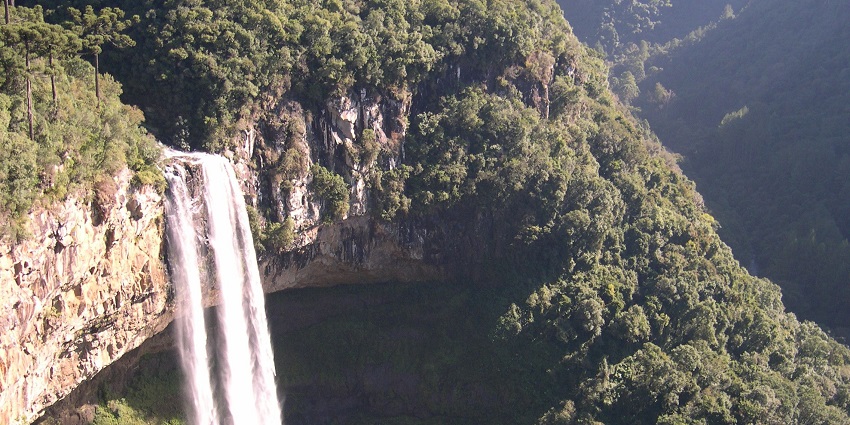
Photo: Andrew McMillan / Wikimedia Commons
Located near Canela in Rio Grande do Sul, Caracol Falls is a striking 131-meter waterfall surrounded by lush forest within Caracol State Park. The waterfall flows over basalt cliffs, creating a beautiful contrast with the green surroundings. Accessible via a cable car and observation decks, Caracol offers sweeping views, making it a favourite for photographers and nature lovers. The park also features hiking trails, a scenic train ride, and a staircase descending close to the base of the falls, where visitors can feel the mist and hear the thunderous sound of water. Caracol Falls is one of southern Brazil’s most popular natural attractions, drawing tourists from all over.
Location: Caracol State Park, Canela, Rio Grande do Sul
Best Time To Visit: April to October
3. Cachoeira Do Tabuleiro
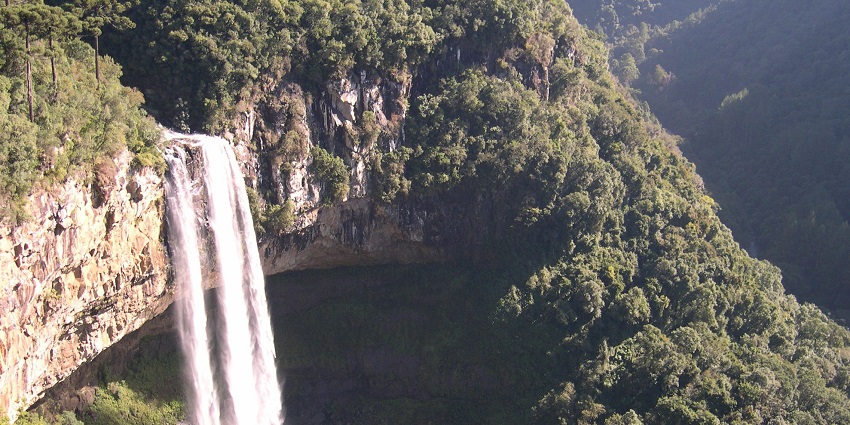
Photo: Thomas Lehmann (Horizonterix) / Wikimedia Commons
Cachoeira do Tabuleiro, located in the Serra do Cipó National Park in Minas Gerais, is Brazil’s third-highest waterfall at 273 meters. This waterfall plunges from rugged cliffs into a large, natural pool surrounded by steep rock walls, creating a dramatic landscape. The hike to Cachoeira do Tabuleiro is challenging, taking approximately three hours to reach, but rewards visitors with breathtaking views and a tranquil atmosphere. The waterfall’s height and scenic beauty make it a favourite for adventure seekers and photographers. The surrounding area also hosts a rich array of plant species, including cacti and orchids, adding to the location’s natural allure.
Location: Serra do Cipó National Park, Minas Gerais
Best Time To Visit: May to September
Suggested Read: Things To Do In Brazil
4. Cachoeira Da Fumaça
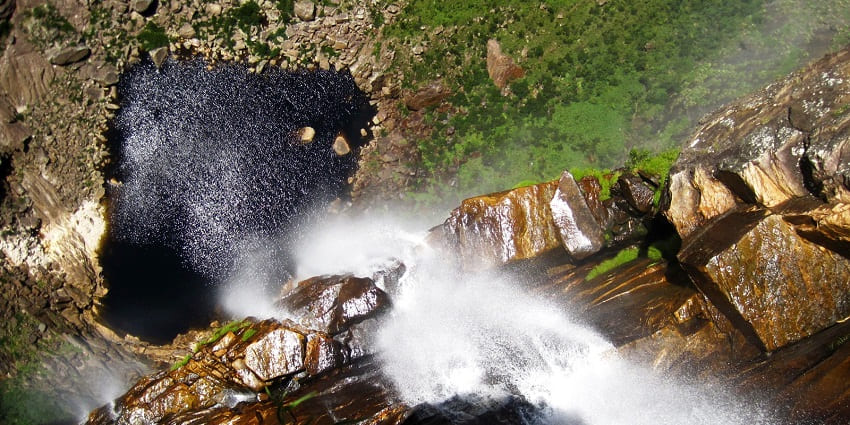
Photo: Cid Costa Neto / Wikimedia Commons
Located in Chapada Diamantina National Park in Bahia, Cachoeira da Fumaça is Brazil’s second-highest waterfall, with a 340-meter drop. Known for its “smoke” effect, where strong winds dissipate the water into mist before it reaches the ground, the waterfall is accessible via a rigorous hiking trail that takes around two hours. The hike rewards visitors with a scenic view from the top, where they can observe the canyon and the surrounding greenery. Cachoeira da Fumaça is an ideal destination for experienced hikers and those seeking the impressive natural beauty of Bahia’s highlands and valleys.
Location: Chapada Diamantina National Park, Bahia
Best Time To Visit: April to September
5. Salto Do Yucuma
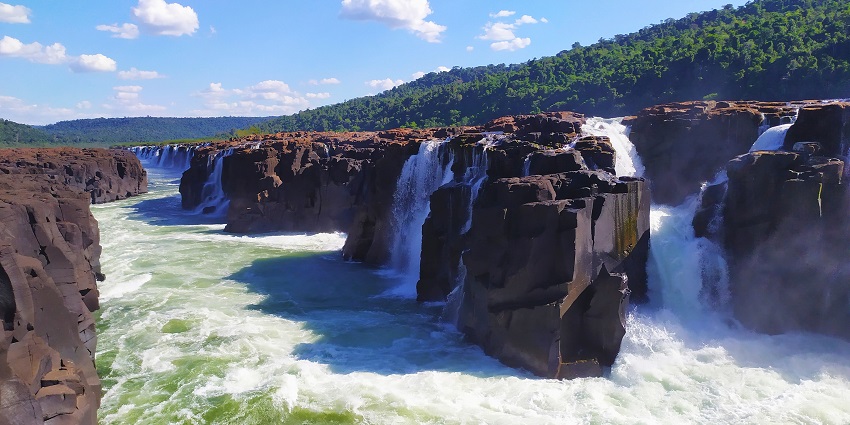
Photo: Anderson cristiano hendgen / Wikimedia Commons / Image For Representation Only
Located in the Turvo State Park in Rio Grande do Sul, Salto do Yucumã is considered the longest linear waterfall in the world, stretching over 1,800 meters. Unlike vertical drops, the falls consist of horizontal cascades formed by the Uruguay River as it flows over basalt formations. The waterfall is set within a forested park filled with native wildlife, including tapirs and ocelots. The best time to visit Salto do Yucumã is during the dry season when the falls are more visible. The park offers guided tours and viewing platforms, allowing visitors to appreciate the unique beauty of this continuous, cascading river.
Location: Turvo State Park, Rio Grande do Sul
Best Time To Visit: May to September
Suggested Read: Places To Visit In Rio
6. Cachoeira Dos Pretos
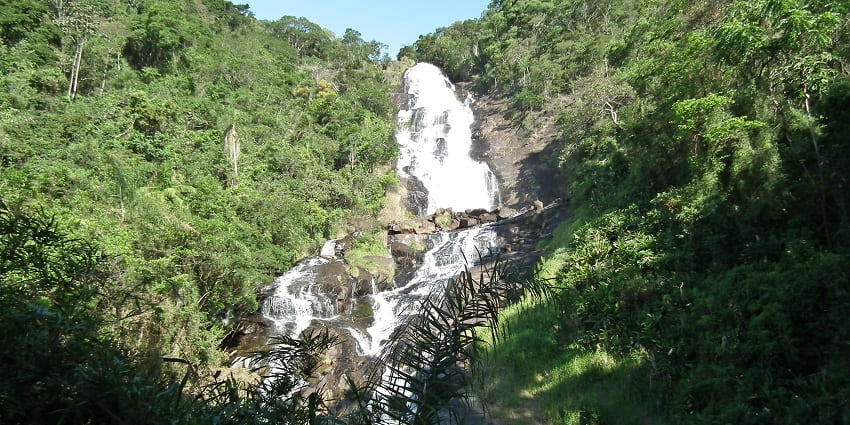
Photo: joao batista Shimoto / Wikimedia Commons
Situated in Joanópolis, São Paulo, Cachoeira dos Pretos is a popular 154-meter waterfall with easy access, making it ideal for families and casual visitors. The waterfall is surrounded by picnic areas, restaurants, and walking trails, providing a full day of activities in a beautiful natural setting. Visitors can also enjoy activities such as paddle boating and zip-lining near the falls. Cachoeira dos Pretos is a well-maintained destination that offers scenic views and a relaxing atmosphere, making it one of São Paulo’s most accessible and beloved waterfalls.
Location: Joanópolis, São Paulo
Best Time To Visit: April to October
7. Cachoeira Do Buracão
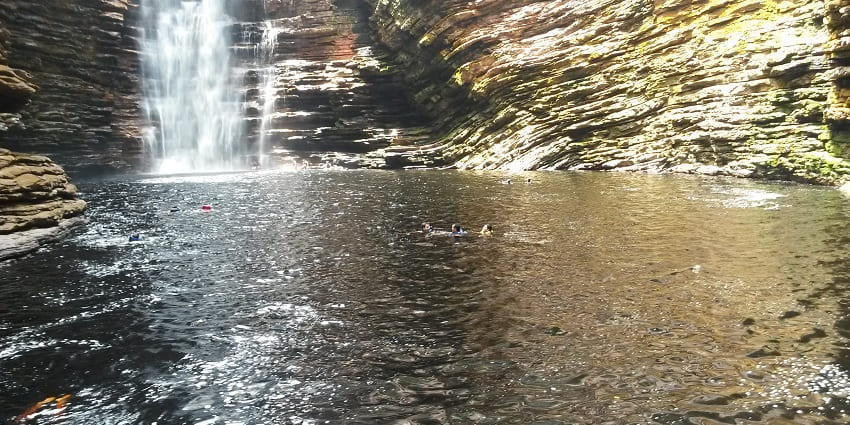
Photo: Bruno Nogueira Meira / Wikimedia Commons
Found in Chapada Diamantina National Park, Cachoeira do Buracão is a 100-meter waterfall known for its secluded and dramatic setting within a narrow canyon. Reaching the waterfall requires a hike through the scenic valley, including wading through water and swimming across a natural pool to get close to the falls. Buracão’s unique location within a canyon creates a captivating ambience and allows for an immersive experience. The waterfall is especially popular for adventure seekers and photographers, offering one of the most thrilling experiences in Bahia’s waterfall landscape.
Location: Chapada Diamantina National Park, Bahia
Best Time To Visit: April to September
Suggested Read: Valentine’s Day In Brazil
8. Cachoeira Do Formiga
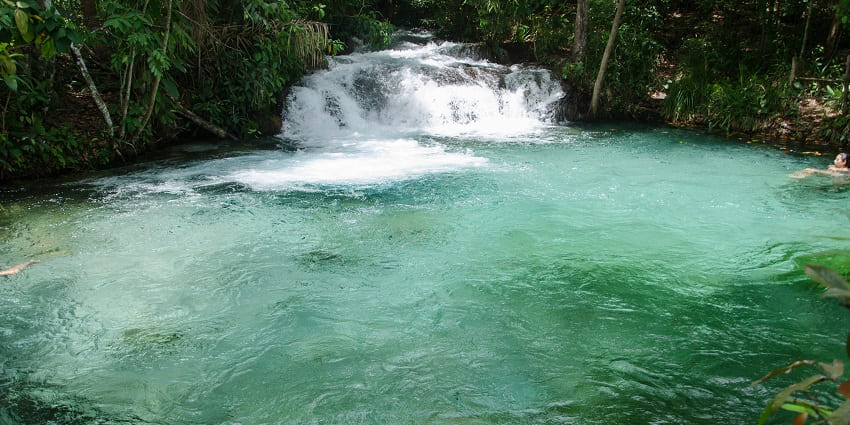
Photo: Filipe gonzaga ferreira / Wikimedia Commons
Located in the Jalapão region of Tocantins, Cachoeira do Formiga is a small but stunning waterfall with crystal-clear, emerald-green waters. Although only a few meters high, the waterfall forms a beautiful natural pool surrounded by lush vegetation, making it ideal for swimming and relaxation. The warm, clear water and tranquil surroundings make Cachoeira do Formiga a favourite spot for visitors exploring Jalapão’s diverse landscapes. The area’s unique flora and fauna, along with the region’s iconic golden sand dunes, add to the experience, making it a gem in central Brazil.
Location: Jalapão, Tocantins
Best Time To Visit: May to September
9 . Cachoeira Da Velha
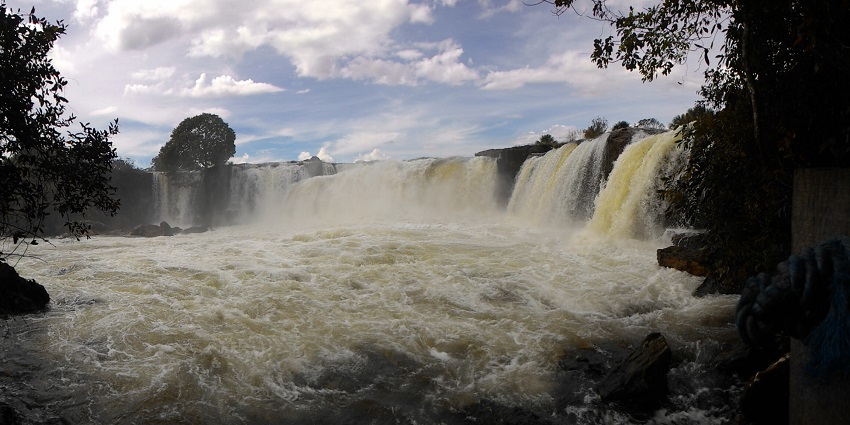
Photo: Felipe Manhães / Wikimedia Commons
Also located in Jalapão, Tocantins, Cachoeira da Velha is one of the largest waterfalls in the region, featuring a wide, horseshoe-shaped fall that spans over 100 meters in width. The waterfall, set amid the savannah-like landscape of Jalapão, is accessible via dirt roads and offers an impressive sight with its roaring waters. A short hike brings visitors to observation decks where they can appreciate the waterfall’s size and power. Although swimming is not permitted directly under the falls due to the strong currents, nearby calmer pools provide a place to cool off. It’s a must-see for anyone visiting Jalapão’s natural attractions.
Location: Jalapão, Tocantins
Best Time To Visit: May to September
Suggested Read: Exploring Brazil Nightlife The Electrifying Destinations For Nyctophiles
10. Cachoeira Do El Dorado
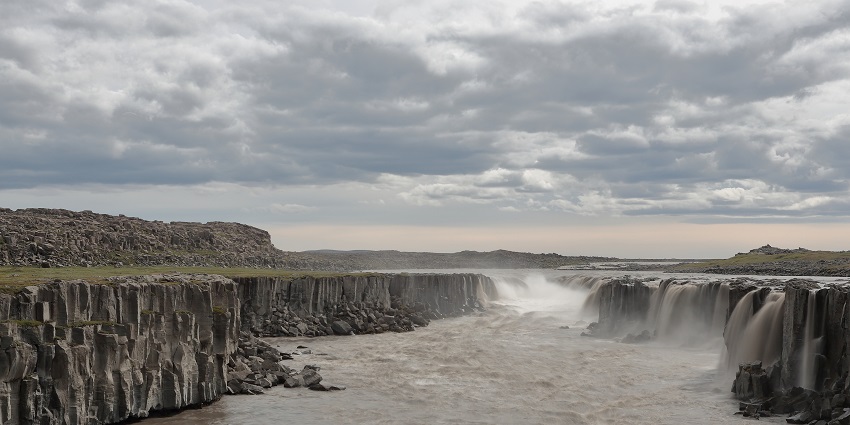
Photo: Martin Falbisoner / Wikimedia Commons / Image For Representation Only
Located in the remote Amazon rainforest in the state of Amazonas, Cachoeira do El Dorado is Brazil’s tallest waterfall at 353 meters. The waterfall is difficult to access, requiring a trip by boat and a hike through dense jungle, but its height and secluded location make it a hidden gem for adventurers. The waterfall drops from a sheer cliff into a rocky pool below, surrounded by the vibrant flora and fauna of the Amazon. Cachoeira do El Dorado offers a unique experience for those seeking an off-the-beaten-path destination, showcasing the raw beauty of Brazil’s rainforest ecosystem.
Location: Amazonas, Brazil
Best Time To Visit: June to November
These Brazil waterfalls are natural treasures that showcase the country’s diverse ecosystems and breathtaking landscapes. From the powerful cascades of Iguazu Falls to the secluded beauty of Cachoeira do El Dorado in the Amazon, each waterfall offers unique experiences. Visiting these falls provides a profound connection to Brazil’s natural beauty, making them must-visit destinations for travellers. Plan your next trip with TripXL to ensure an amazing experience.
Cover Photo: Francesco Ungaro / Pexels / Image For Representation Only


 WhatsApp
WhatsApp
 Twitter
Twitter









